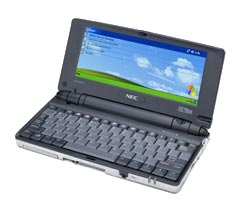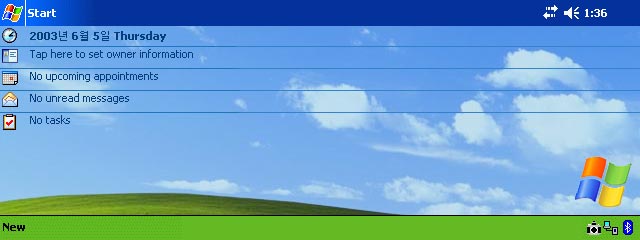Windows Mobile Handheld PC 2003: Blasphemous thoughtsChris Tilley | Editor-in-Chief Could the answer to the HPC conundrum be a trip to the dark sideCould the latest Pocket PC release be our savior?I posted a item on the Handheld PC news group some months ago about the pending release of Pocket PC 2003. Well, that day is upon us. 23rd June 2003 will forever be remembered as the first day of the release of Pocket PC 2003, or as it shall hence forth be known: Windows Mobile 2003. I was reading an overview of WM 2003, which was a fairly uninspired one in the August issue of Personal Computer World magazine. The new features in WM 2003 are themselves fairly uninspired and can barely be classed as evolutionary, at least as far as where general PDA's are concerned. It then struck me, The Pocket PC Operating System is essentially a Shell, GUI and API set that sits on top of the CE core Operating System. We know, thanks to Siemens with their Tablet PC's and from my own experiments with Platform Builder 4.1, that current line of HPCs can run the 4.x core; The question I found myself asking was Why couldn't a HPC run with the Windows Mobile 2003 front end?
Technical aspects aside, the obvious questions is does the UI offered by the familiar HPC 2000, 3, 2 and 1 platform make the HPC a HPC. Could & would HPC users be happy to use the Pocket PC's flat, bright and (in my opinion) rather uninspiring user interface on their beloved devices? Could this be a way to thrust the HPC finally into the 21st century. If it is at all possible to do, it would certainly solve the problem that developers & IVHs (Independent Hardware Vendors) are faced with whenever they create a new application aimed at Windows CE devices. Do I sit down and port my code over to the Handheld PC? This point becomes mute. The HPC could still retain its professional and service sector workings, Platform Builder 4.x allows for the development of skin able devices. In an enterprise environment, such as electronic warehousing processes, The necessity of Pocket Outlook for example, is non-existent. As for the OEM, this could truly be a chance at getting the HPC market out there. Yes, there is the inconvenience of having to create a second Platform build for the device. Think of it as a pay off for increased sales volume. All the OEM would need to do is add a check box to the order form. "Work Horse or Power PDA?"
Can the preverbal Carrot on a stick be enough for the HPC end user to think this a viable trade-off for the continued development of the platform?
This is what's new for the 2003 release of the Pocket PC form factor devices. Coupled with the enhancements made in Pocket PC 2000 and 2002, most of which the HPC community has lost out on, the potential gain for the average HPC user is vast.
But once again I have to pose the question Would the benefits be at too great an expense? Personally, to be safe in the knowledge that the form factor and community would survive, I think I could adapt. There undoubtedly will be a case for both sides, there will be the group who hands down rebuff the idea as unpractical, impossible. Likewise the group who are intrigued by the idea and the reprise that it could offer the HPC. Either way, I encourage debate amongst members of the community. who knows, perhaps a OEM is listening. With Thanks to Brighthand & Akihabara News. Want to let us know what you think of this article? Let us know your thoughts on "Windows Mobile Handheld PC 2003: Blasphemous thoughts" in the discussion therad in the Community Forums!Tags | Editorial OpEd Windows CE Windows Mobile
|

 The embedded operating system is just a block of code that loads specific drivers which, when the necessary hardware is found are mounted for use by the system. As far as it the OS should be concerned a IrDA port is an IrDA port, touch Screen a touch screen, CF slot a CF slot irrespective of whether its on the side of a Clamshell Handheld PC or a QVGA Pocket PC.
The embedded operating system is just a block of code that loads specific drivers which, when the necessary hardware is found are mounted for use by the system. As far as it the OS should be concerned a IrDA port is an IrDA port, touch Screen a touch screen, CF slot a CF slot irrespective of whether its on the side of a Clamshell Handheld PC or a QVGA Pocket PC.
